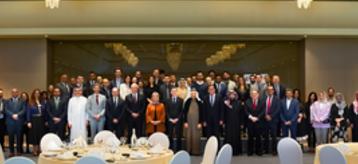Islamic finance has achieved sizeable market share

MANAMA: Islamic banks need to learn that there is a huge price to pay for laxity in compliance, lack of appropriate controls and poor risk management, Central Bank of Bahrain (CBB) Governor Rasheed Al Maraj has warned.
Delivering the opening keynote address at the 25th edition of the World Islamic Banking Conference (WIBC) at the ART Rotana, Amwaj Islands yesterday, Mr Al Maraj emphasised the importance of good governance, risk management and compliance practices.
“During the last decade the top 10 global banks have paid more than $250 billion in fines and penalties and have had to fire hundreds of thousands of their employees to reduce costs and sustain themselves.
“This is the price for laxity in compliance, lack of appropriate controls and poor risk management. If there is one lesson that Islamic banks can learn from their conventional peers it is this,” he said.
According to him most bankers think of compliance as merely a cost centre forgetting lessons learned from the global financial crisis.
“A far-sighted leader should never opt for a quick buck while ignoring the long-term consequences.”
The CBB Governor also said his expectations from the Islamic finance industry have not been met fully, despite 40 years having passed since the first Islamic bank was set up in Bahrain.
“Islamic finance has achieved size, scale, market share and customer attention in many markets around the world including Bahrain, however the progress towards ‘Maqasid-e-Sharia – the guiding principles of Islamic finance’ remains painfully slow, which in my opinion should have been the single most important indicator of real success.”
Stating that regional and global co-operation can open new doors for the Islamic finance sector, Mr Al Maraj said this would only be possible with pre-requisites like leadership, standardisation, good governance, risk management and compliance, being in place.
“The leadership of Islamic financial institutions has to show exceptional professional competence and integrity to lead the industry to the next level of growth.”
Sharia standards, accounting standards, prudential standards and best market practices, all need to be developed for the Islamic finance industry with the global audience in mind, he said.
“Accounting and Auditing Organisation for Islamic Financial Institutions (AAOIFI) has been doing excellent work on Sharia and accounting standards while Islamic Financial Services Board (IFSB) has developed risk management and capital adequacy standards which conform to global best practices, whereas International Islamic Financial Market (IIFM) has contributed towards standardising money and capital market contracts as well as financing contracts,” said the CBB Governor.
According to him, what was needed now was to convince regulators and market players to adopt AAOIFI, IFSB and IIFM standards in their respective markets.
Lauding the organisers, Mr Al Maraj said over the last 25 years, the WIBC has become the indisputable compass for the global Islamic finance and banking industry, building a robust platform that comprises leading bankers, institutional investors, asset managers, policy-makers, academics and other stakeholders from across the globe.
More than 1,300 people from 50 countries have gathered for the landmark edition of the WIBC being held under the patronage of His Royal Highness Prime Minister Prince Khalifa bin Salman Al Khalifa.
Discussions around the theme of Islamic finance and sustainable growth in the age of disruption will continue today before the conference draws to a close.
Source: http://www.gdnonline.com/Details/443115


